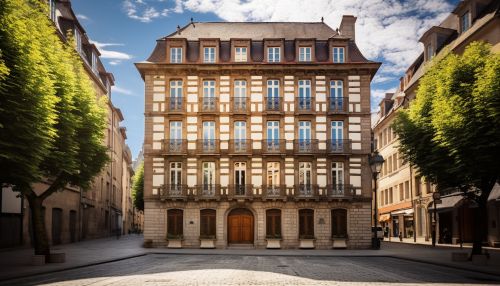Blaise Pascal
Early Life
Blaise Pascal was born on June 19, 1623, in Clermont-Ferrand, France. His father, Étienne Pascal, was a local magistrate and tax collector, and his mother, Antoinette Begon, died when Pascal was just three years old. Pascal was the second of three children, with an older sister, Gilberte, and a younger sister, Jacqueline.


Education
Pascal's father took on the responsibility of educating his children after the death of their mother. Recognizing Pascal's exceptional mathematical abilities at a young age, Étienne Pascal decided to teach Pascal himself, focusing on mathematics and natural science. Pascal's education was rigorous and comprehensive, and he quickly surpassed his father's knowledge in mathematics. By the age of 16, Pascal had already made significant contributions to the field of mathematics, including his notable work on conic sections.
Contributions to Mathematics
Pascal's contributions to mathematics are numerous and significant. His early work on conic sections led to the publication of his "Essay on Conics" in 1640, which introduced what is now known as Pascal's Theorem. This theorem states that if a hexagon is inscribed in a conic section, the three intersection points of opposite sides lie on a straight line, known as the Pascal's line.
Pascal also made significant contributions to the field of probability theory. In correspondence with fellow mathematician Pierre de Fermat, Pascal helped lay the foundation for the theory of probability. Their work on the problem of points, which involved determining the most equitable way to distribute stakes in a game of chance when the game is interrupted, is considered a seminal work in the field of probability.
In addition to his work in mathematics, Pascal also invented the Pascal's calculator, an early mechanical calculator capable of addition and subtraction, in an attempt to ease his father's tax calculating workload.
Contributions to Physics
Pascal's contributions to physics primarily revolved around the principles of fluid mechanics and pressure. His experiments on atmospheric pressure led to the formulation of Pascal's law, which states that pressure applied to an enclosed fluid is transmitted undiminished to every part of the fluid and the walls of its container. This principle is fundamental in the field of hydraulics.
Pascal also invented the Pascal's barrel, an experiment demonstrating the effect of pressure on a fluid. He further demonstrated that the atmospheric pressure decreases with the increase of altitude by carrying a barometer up a mountain and observing the drop in mercury level.
Religious Philosophy
In addition to his scientific pursuits, Pascal was deeply religious. After a profound religious experience in 1654, known as the "Night of Fire", Pascal turned his focus towards theology and philosophy. He began writing a defense of the Christian religion, known as the Pensées, which was published posthumously.
Pascal is also known for his Pascal's Wager, a philosophical argument for belief in God. The wager argues that a rational person should live as though God exists, because the potential benefits of belief are infinite, while the potential losses are finite.
Later Life and Death
Pascal's health began to decline in his late 30s. He died on August 19, 1662, at the age of 39, likely from a combination of stomach cancer and tuberculosis. Despite his short life, Pascal's contributions to mathematics, physics, and philosophy have had a lasting impact on these fields.
Legacy
Pascal's work continues to influence modern mathematics and science. His principles of pressure and fluid mechanics form the basis for much of modern hydraulics, and his contributions to probability theory have implications in fields as diverse as statistics, economics, and computer science. In philosophy, Pascal's Wager continues to be a topic of debate among scholars. Pascal's legacy is also recognized in the naming of the Pascal (unit), the SI unit of pressure, in his honor.
